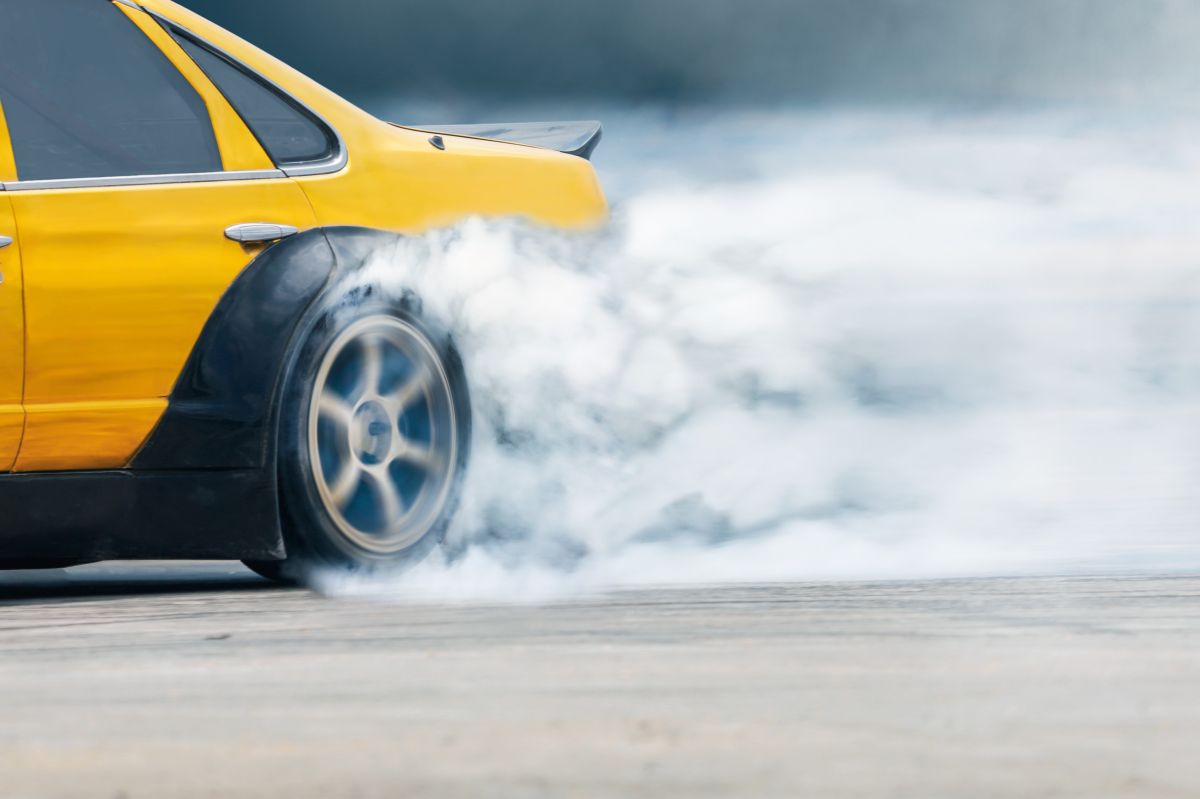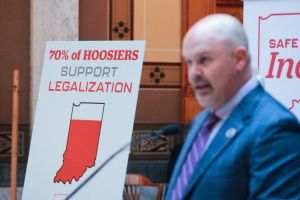
A Republican-backed bill under consideration by the Indiana General Assembly seeks to crack down on dangerous street takeovers, which lawmakers said are increasingly an issue for law enforcement. (toa555/Adobe Stock)
After a failed attempt during the 2024 session, Indiana lawmakers are reviving efforts to get tough on street takeovers, also known as “sideshows.”
Senate Bill 13, authored by Republican Sen. Jim Tomes, of Wadesville, would establish a Class B misdemeanor for “knowingly, intentionally, or recklessly operate[ing] a vehicle in a repeated or continuous manner with the intent of causing the vehicle to perform a rotational skid.” The crime would increase to a Class A misdemeanor if the illegal activity endangers another person. The penalty further climbs to a Level 6 felony if it causes someone bodily injury, and to a Level 5 felony if it results in a death.
In its current form, the measure does not apply to a person who operates a vehicle at an “off-road recreation area” or another location where such vehicle performance is permitted, such as private property.
“There’s a collection of people who take their cars — these are usually high performance cars, very expensive cars … and they gather up in a main intersection, downtown area, where they put on these performances,” Tomes told the Senate corrections committee on Tuesday, adding that sometimes, the events can last “for hours on end.”
“It’s pretty noisy, especially in the business or residential areas. It’s annoying, I’m sure,” the senator continued. “But they’re just around and around in circles. And there are multiple cars … a lot of bystanders show up, and they’re watching this.”
Large-scale street takeovers — which are often organized through social media, making them difficult to predict and prevent — typically attract dozens of people who block off public roads, highways, or intersections to hold illegal street races.
Gatherers will also perform dangerous car stunts like burnouts or drifting. Spectators often participate by running in between moving cars.
Lawmakers said street takeovers have increasingly become an issue for police.
“I’ve seen some of the reports that have come in where law enforcement arrives and it turns into an engagement,” Tomes said. “The cop cars have been attacked, the police have been attacked. And for the life of me, I don’t know how this can go on. We have to put some sort of an end to that.”
In a September incident documented by Indianapolis police, crowds of people lit a circle of flames in the middle of an intersection while drivers performed high-speed donuts, burnouts and other tricks.
When law enforcement tried to break up the event, a crowd threw burning baseball bats and gas cans at officers.
Police said other attempts to shut down street takeovers have resulted in car chases and people smashing police cruisers with baseball bats.
The events have also been connected to pedestrian injuries and shootings, and intoxicated crowds sometimes engage in fighting and looting after takeovers end, officials said in recent media reports.
A 2024 bill introduced by Sen. Aaron Freeman, R-Indianapolis, sought to crack down on street takeovers but ultimately failed to pass. That proposal would have allowed police to seize vehicles that were caught at more than one takeover, among other penalties.
Need to get in touch?
Have a news tip?
In a 5-4 vote on Tuesday, the committee narrowly approved Freeman’s proposed amendment to Tomes’ new bill that would do something similar — allowing civil forfeiture of a vehicle on first offense. Democrats — along with Republican Sens. Liz Brown, R-Fort Wayne, and Sue Glick, R-LaGrange — were opposed to the addition.
Two other changes were approved, too, including one amendment to allow alleged offenders to seek specialized driving privileges while their case is litigated. Another amendment would prohibit a vehicle’s owner from being charged unless law enforcement can prove they knowingly permitted the vehicle to be used for stunts or “spinning.”
Freeman, the corrections committee chairman, did not put the bill to a vote following a back and forth over possible amendments. Concerned committee members questioned, for example, whether the bill’s language should better distinguish reckless driving exhibited at street takeovers from other, more general forms of reckless driving.
The measure could next see action when the committee reconvenes in two weeks.
Doubling down on signal jammers
In a different bill heard Tuesday by the Senate committee, Tomes additionally targeted signal jammers, devices that can block Wi-Fi, Bluetooth, GPS and more — impacting devices like phones, Ring doorbells and wireless alarm systems.
Senate Bill 26 creates a Level 6 felony for anyone who “owns, operates, uses, manufactures, possesses, buys, sells, or provides to another person a radio frequency jamming device.” That enhances to a Level 6 felony if the jamming device is used to disrupt a “critical infrastructure facility” or law enforcement.
Tomes pointed an incident last year in Vanderburgh County, when a signal jammer was used during a burglary as a means to thwart police.
When an officer pulled the suspect’s car over, his radio and computer stopped working.
Signal jammers are already illegal on the federal level. The Federal Communications Commission prohibits marketing, selling or using any device that interferes with authorized radio communications.
The committee struggled, however, over whether state law should ban jammers altogether — with a felony attached. Rather, multiple Republicans and Democrats on the panel suggested the bill make clearer what would be outlawed. And some lawmakers said penalties should only apply when signal jammers are put to use.
“I use one in my house because I don’t want a drone flying over and tapping into my Wi-Fi, right? Or I might have a neighbor who I know is using my Wi-Fi signal, and I want to jam anybody from tapping in,” said Sen. Greg Taylor, D-Indianapolis. “Those are legitimate, in my opinion, property owner rights that I should be able to do without becoming a felon.”
Tomes pushed back, saying that jammers could still impede critical law enforcement activities.
“I think the common person would ask the question, ‘Why would you want one?’ Unless you want to use it for maybe nefarious reasons,” Tomes said.
The bill advanced from the committee along party lines in a 6-2 vote, with Tomes willing to amend the bill on the Senate floor to address his colleagues’ ownership concerns.
An expansion of Indiana’s Lifeline Law
Also advanced Tuesday was a bill to extend Indiana’s Lifeline Law, which provides legal protections to minors under the influence of alcohol who call to report a medical emergency or a crime.
The bill, proposed by Sen. Ron Alting, R-Lafayette, would extend protections to an underage person who is in need of medical help as a result of alcohol overconsumption.
“This bill would resonate with many young Hoosiers who want to get help for their friends and classmates,” Alting said, adding that Indiana’s current lifeline law has saved 57 lives in the last decade.
Even so, roughly 100 Hoosiers under the age of 21 die each year due to alcohol-related causes. The senator maintained that another expansion of Indiana’s Lifeline Law “would protect Hoosier students and ensure they get proper medical treatment.”
Like under current law, any person who calls for help or needs assistance will only avoid prosecution for underage drinking if they cooperate with authorities. The law also does not provide protection for other crimes, such as providing alcohol to a minor or driving while intoxicated.
Former Republican Sen. Jim Merritt first championed the “Good Samaritan” law in 2012 to decrease alcohol-related deaths among young Hoosiers. Other protections were later added in 2014.
At that time, Indiana was one of just a few states to have such a law on the books, though a majority of states now have a medical amnesty statute.
GET THE MORNING HEADLINES.
Indiana Capital Chronicle is part of States Newsroom, a nonprofit news network supported by grants and a coalition of donors as a 501c(3) public charity. Indiana Capital Chronicle maintains editorial independence. Contact Editor Niki Kelly for questions: info@indianacapitalchronicle.com.











